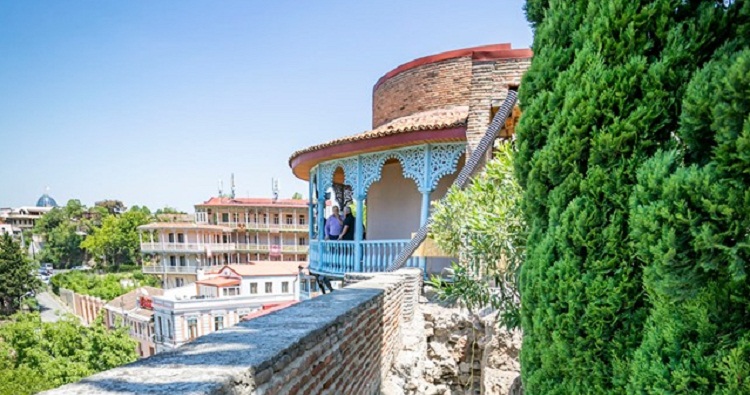18th century iconic Tbilisi palace undergoing restoration

The palace which belonged to Georgian King Erekle II’s wife Darejan is located on the rock at the left bank of River Mtkvari. Photo: Tbilisi City Hall.
A historic palace located at the foot of Metekhi rock overlooking the Georgian capital of Tbilisi is undergoing major renovation, announces the Tbilisi City Hall.
Built in the 18th century palace Sachino, a summer residence of Queen Darejan, the wife of King Erekle the Second, is one of two palaces in Tbilisi that remains to this day.
 Renovation work has already been launched. Photo: Tbilisi City Hall.
Renovation work has already been launched. Photo: Tbilisi City Hall.
About 2 million GEL ($710,480/€629,474) will be spent on the renovation of the Sachino palace (which is also called Queen Darejan Palace) and the work is due to be completed in 16 months.
We will do our best to make this area one of the best [in Tbilisi]. It is a very attractive place for tourists, many people visit the palace... This project is of utmost significance as the palace is a cultural monument,” Tbilisi Mayor Kakha Kaladze said when visiting the renovation site today.
In 16 months the palace complex, which includes the King Erekle’s bath, a church and a fence of the palace, will be completely restored.
Besides, conservation work of the wall painting of the Peristsvaleba [Transfiguration of Jesus] Church will be carried out which will cost 52,000 GEL”, said Kaladze.
 View from the Queen Darejan's palace. Photo: Tbilisi City Hall.
View from the Queen Darejan's palace. Photo: Tbilisi City Hall.
The Queen Darejan Palace was built in the form of a castle to protect its inhabitants from continual invasions of foreign occupiers. However, neither the location on the top of the rock, nor the high defensive walls could protect the palace from the Iranian invasion of Agha Mohammad Khan at the end of the 18th century. As a result, the palace was destroyed and ravaged.
After this invasion the King Erekle moved to Telavi, Kakheti where he died in 1798. Having lived for some more time in her palace the queen Darejan was deported to Russia on a charge of a plot against the future head of state appointed by the Russian Emperor.
 Tweet
Tweet  Share
Share